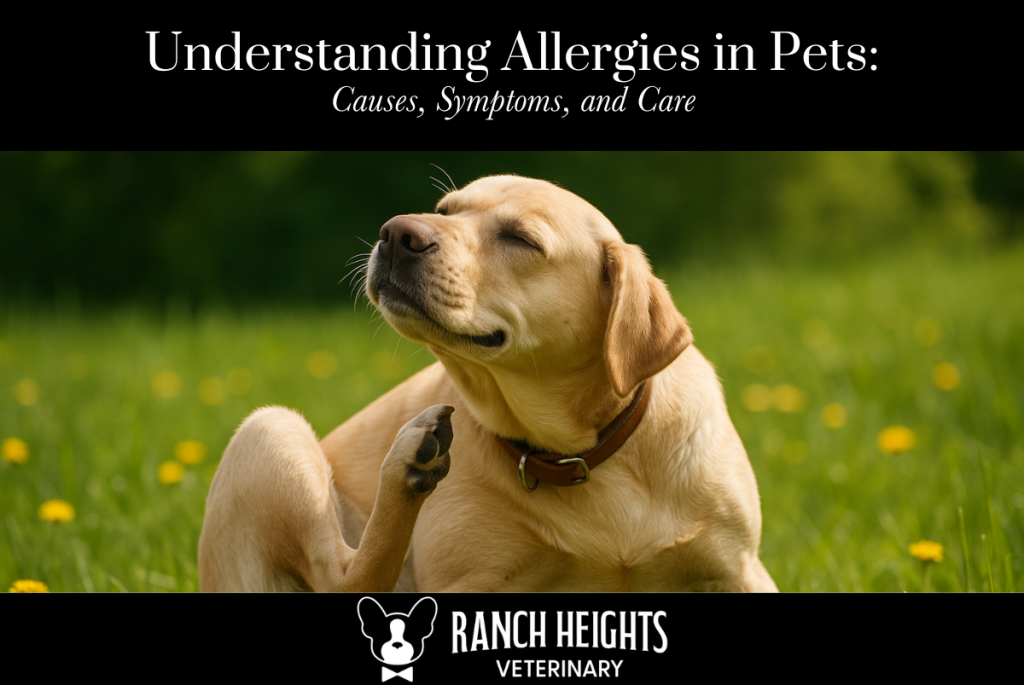
Allergies aren’t just a human problem—our pets can suffer from them too. At Ranch Heights Veterinary, we regularly see dogs and cats experiencing discomfort from environmental triggers, food sensitivities, or seasonal changes. Left untreated, allergies can impact your pet’s quality of life and lead to chronic skin and ear infections.
In this post, we’ll explain the most common types of allergies in pets, the signs to watch for, and the treatments available to help your furry family member live more comfortably.
Common Types of Allergies in Pets
- Environmental Allergies (Atopy)
Pets can be allergic to pollen, dust mites, mold, or even certain cleaning products. Symptoms often worsen during specific seasons. - Food Allergies
Proteins like beef, chicken, or dairy are common culprits. Food allergies may cause skin problems, digestive upset, or both. - Flea Allergy Dermatitis (FAD)
Some pets develop extreme sensitivity to flea saliva, causing intense itching and skin irritation—even from a single bite. - Contact Allergies
Less common, but can result from direct contact with materials like certain fabrics, shampoos, or grasses.
Signs Your Pet May Have Allergies
- Constant scratching, licking, or chewing
- Hair loss or hot spots
- Chronic ear infections or head shaking
- Red, inflamed skin or rashes
- Watery eyes or sneezing
- Vomiting or diarrhea (more common with food allergies)
If you notice these symptoms, a veterinary exam is important. Allergies can mimic other conditions, so professional diagnosis is key.
Treatment Options
At Ranch Heights Veterinary, we tailor allergy treatments to each pet’s unique needs. Options may include:
- Medications: Anti-itch medications (e.g. Cytopoint), antihistamines, or corticosteroids to manage symptoms.
- Allergy Testing & Immunotherapy: Identifying specific allergens and creating custom allergy “shots” or drops.
- Prescription Diets: Specially formulated foods that reduce allergic responses.
- Flea Control: Year-round prevention to protect sensitive pets.
- Topical Care: Medicated shampoos, sprays, or ointments to soothe skin.
Q&A: Pet Allergies
Q: Can pets develop allergies later in life?
A: Yes. Allergies can appear at any age, even if your pet has never had issues before.
Q: Are certain breeds more prone to allergies?
A: Yes, breeds like Bulldogs, Retrievers, Terriers, and Siamese cats are more susceptible to skin and environmental allergies.
Q: How can I tell if my pet has a food allergy vs. an environmental allergy?
A: Food allergies often show up year-round and may include digestive issues, while environmental allergies can be seasonal. Testing and food trials help determine the difference.
Q: Can allergies be cured?
A: Allergies cannot usually be “cured,” but they can be effectively managed with proper veterinary care, lifestyle adjustments, and ongoing treatment.
Q: What happens if allergies go untreated?
A: Untreated allergies may lead to severe skin infections, chronic discomfort, and long-term health complications. Early care is best.
Contact Ranch Heights Veterinary
If your pet is showing signs of allergies, don’t wait—early treatment makes all the difference.
Ranch Heights Veterinary
📍 2651 Irvine Avenue STE 128, Costa Mesa, CA 92627
📞 Phone: (949) 630-3517
Our team is here to provide compassionate, personalized allergy care for your furry family members.
